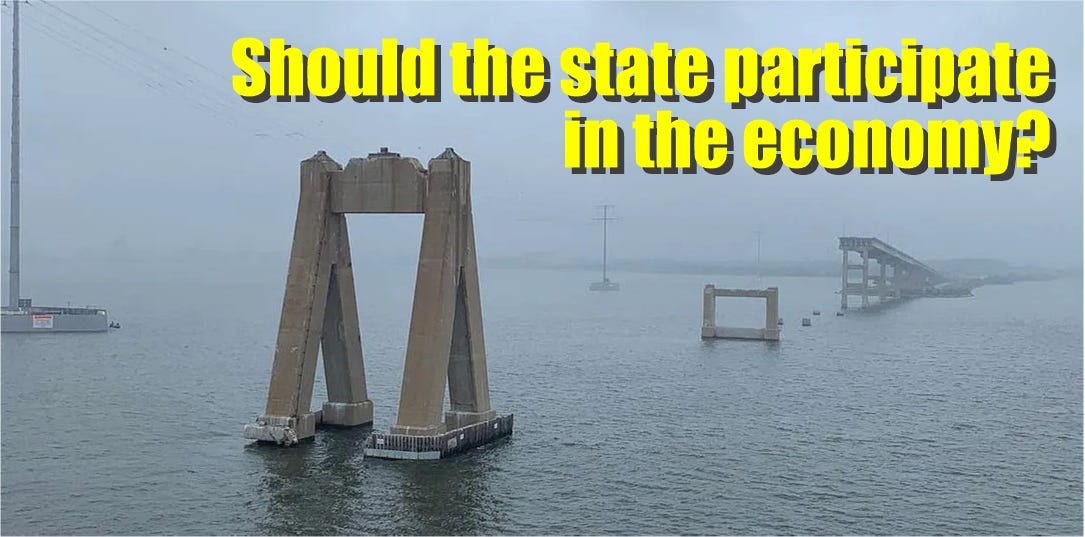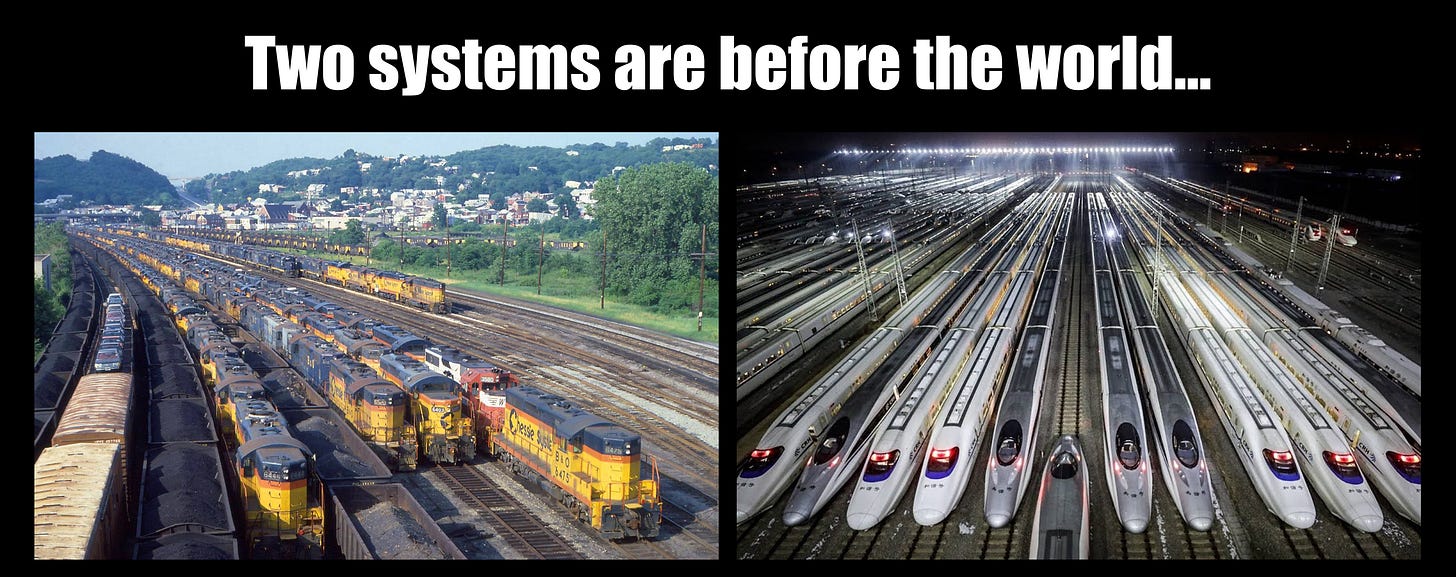Multipolar integrations: the other system (part 2)
"Tthe Jetsons" future is on the horizon, but leaders in the West want war and more war.
Just as I was wrapping my three days in Istanbul last week, my friends Matt Smith and Doug Casey posted a fascinating article at Doug Casey’s Crisis Investing about their “Strange Trip to Azerbaijan.” This article was very fascinating and timely in a way; it was related to my own visit in Azerbaijan in 2022 and the impressions I gathered through my participation at the Verona Forums. At the time I published a brief report about it: “A report from Eurasian Integrations conference.” Again, the focus of discussions were the real, concrete solutions that were actually being developed and implemented in many Eurasian countries and Africa. At the time I wrote that,
“… the most important impression I got from the conference was a real sense of optimism about the future. It wasn’t explicitly stated – nobody was selling the agenda or expounding about the great expectations. But the underlying sense of optimism was quite obvious to me because it stands in such stark contrast to the pessimism that has now engulfed much of the western world. In all, Eurasian integration seems like the real deal; a genuine shift in the march of history. It should be a very hopeful change for mankind.”
Four years later, Casey’s and Smith’s article brought home just how much of a real deal these developments are. Matt Smith wrote about the infrastructure development that Azerbaijan has undertaken over the last five years:
By far, the most impressive thing I saw during our visit was the level of construction occurring in the country… the scale of which is almost beyond imagination. … occasionally I could glimpse below in the valley a brand new highway system which included dozens of tunnels. Now this is probably the most difficult terrain possible to do major construction.
And yet what I glimpsed from above was shocking in scale. … along the roads that we traveled, there were endless streams of heavy equipment, hard at work, reshaping the landscape to expand the highway system we were on. There were cement factories everywhere built bespoke to support this ambitious effort.
The scale was so massive, so inorganic, and so out of place, we had a hard time making sense of it. To do something like this in America would be utterly impossible. It would cost trillions of dollars. The thinking required, too big, the manpower, unavailable, the will, long gone. … seeing this scale of construction, the costs I imagined seemed utterly impossible. And so, at my earliest opportunity, I did some research. What I found was shocking.
And what Smith shared next, truly is shocking:
Azerbaijan had built 4,000 kilometers of highway, 45 tunnels, including the second longest in the world, 447 bridges, 16 viaducts. Much of this over very, very difficult terrain. The project was mostly complete. And the total project time was less than five years. All this they’re doing for approximately $5 billion.
To put that in perspective, on March 26, 2024, the Francis Scott Key Bridge in Baltimore was damaged when a container ship collided into it. As of today, the bridge stands unusable. No repair work has yet started. The estimated cost for reconstruction of that bridge is between $1.7 billion and $1.9 billion. And when will it be done? It hasn’t even started yet. The current target completion date is October 2028.
So, in four and a half years, and for about $2 billion, we get an old and important bridge replaced in one of America’s cities. And in Azerbaijan, for $5 billion, they get 447 bridges, 4,000 kilometers of highways, dozens of tunnels including the second longest tunnel in the world. All in less than five years.
It’s the choice between two systems…
I appreciate that Azerbaijan’s development could be controversial from the geopolitical point of view, but here we’re not talking about geopolitics but the possibilities of economic development that are available to all of humanity. It’s the story about two alternative systems of governance: the British free trade system vs. the national system of political economy, or the “American system.” This is important to understand because in the West, we’ve been kept in the dark about these lessons and seem to accept economic decay and dilapidated infrastructure as part of our normal.
While nations like Russia, China, Azerbaijan and many others are ploughing ahead, the United States is spending $250 billion on infrastructure each year with very little to show for it. Politicians have been talking about building high speed railways connecting U.S. cities for at least three decades now, but zero functional high-speed rail connections have been built.
Of course, the problem is not in the American people but in the system. Rather than investing in infrastructure and production of goods and services that actually serve the needs of society, colossal amounts of capital are being squandered on military hardware, ammunitions and warfare - goods destined only for destruction, to the ultimate benefit of the too-big-to-fail banking institutions and their clients in the military-industrial complex. This squandering of resources is being done to everyone else’s detriment. I elaborated the contrast between the two alternative systems of economic governance a few weeks ago:
Two systems are before the world
Alex Krainer, Sep 24
In our times, understanding the clash between the two systems of governance could be more relevant to the future development of humanity than ever before. Unfortunately, that understanding is hard to come by as it has been deliberately obscured. Today, certain Western leaders speak of the conflict of
Free trade system: long on ideology, short on results
As consistent failings of the British free trade system are becoming more and more obvious, they are being covered with incoherent ideological precepts while the real solutions are being attacked, also on ideological grounds. Any initiative driven by the state is being attacked as “socialism,” or “communism,” without any regards to the actual outcomes. With time, the contrast will keep getting more obvious still.
For example, recently I wrote about the Russian breakthrough with the Burevestnik cruise missile which has a completely new nuclear-powered jet engine. Beyond changing the superpowers’ nuclear standoff equation, this breakthrough might also change the transport and infrastructure equations. What if nuclear-powered jet engines become adapted to civilian uses in the future, powering large and small aircraft, trains or even flying personal cars? What if nuclear-powered drones become a means of transport for cargo and people? That could look like The Jetsons’ vision of the future!
Doug Casey’s and Matt Smith’s report from Azerbaijan indicates the kind of development and future that could be ours to have - there is absolutely no reason why it shouldn’t.
But instead of offering constructive cooperation to everyone’s benefit, Western leaders are obsessed with zero-sum agendas and confrontations: which natural gas pipelines to blow up next, what country’s regime needs to be toppled in the name of democracy and freedom, what size bounty they should be set for other nations’ leaders, and where to drop more bombs. We’re dropping so many, apparently we’ve run out, LOL! Not to worry, the bombs are being put to good use and, “We’re killing all the right people,” as U.S. Senator Lindsay Graham gleefully announced.
The time to push back is now. Tomorrow could be too late.
In the EU, which is becoming less and less relevant by the day, virtually all policy discussions start and finish with one overarching objective: preparing for war against Russia. Very unfortunately, such preparations entail destroying the economy and creating high levels of youth unemployment. Young men with jobs and good career prospects aren’t willing to go to war. To make them willing, they must first be robbed of their future. Then they must be convinced that Russia is to blame. Finally, they must be recruited, trained up and armed to fight the enemy they’re told to fight.
That, in a nutshell, is the tragedy of the Western world. That tragedy awaits our sons if we remain silent and passive. Ours is the choice between blind and passive acquiescence and the struggle for a better future. If we are to change the direction in which our nations are moving, our struggle will have to be active, deliberate and bold. We must do so now, while our lives and our societies are still intact, and our children still alive. Once the danger materializes, when the pathology fully hatches, it could be too late. Just ask the parents of the 1 million+ Ukrainian youth who have been sacrificed in the war to destabilize and regime-change Russia.
Alex Krainer – @NakedHedgie is the creator of I-System Trend Following and publisher of daily TrendCompass reports which cover over 200 financial and commodities markets. One-month test drive is always free of charge. To learn more about TrendCompass reports please check our main TrendCompass web page. To start your trial subscription, drop us an email at TrendCompass@ISystem-TF.com, or:
Check out TrendCompass report on Substack, providing daily trend following signals for 18 key global markets, including Bitcoin and gold, for under $1/day!
For US investors, we propose a trend-driven inflation/recession resilient portfolio covering a basket of 30+ financial and commodities markets. Further information is at this link.




Hi Alex, as a Russian, I've been listening to numerous Russian geopolitical analysts. It seems, the consensus among many of them, as it comes to potential direct confrontation between Russia and NATO, is that Russia's responce will be very harsh.
Russia will have no pity or restrain when fighting the Europeans. Ukranians are considered relatives, gone mad, but still relatives. Thus, such surgical, carefull advances of the Russian SMO.
No such curtesy will be given to Europeans. No Russian troops on the ground. More likely just nuking hard all the Euro infrustracture to sink it to the Middle Ages. Europeans said and did too much to have even a shred of pity left for their sad fate among Russians. It wont be pretty.
Like Michael Tyson once said "Everyone got a plan, untill they get punched in the face".
“War, good God y’all, what is it good for? Absolutely nothing”